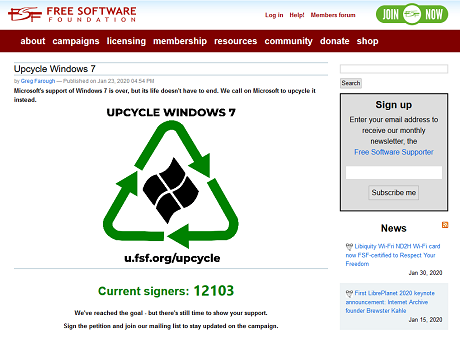Itís not every day that an operating system retires. Windows 7 reaching end of support status on January 14 has been very much the biggest news story in technology this year.
The deadline had users finally saying goodbye to the classic OS and upgrading to Windows 10, companies rushing out to buy new hardware, and people speaking their minds about how they felt about leaving their favorite platform behind ó Windows 7 was even trending on social media!
But perhaps the most surprising voices are the ones demanding Microsoft to open-source Windows 7 and release the OS as free software, allowing the community to maintain it.
Surprising indeed.

Oh, itís the FSF again!
With one of the most popular versions of Windows has reached the end of life, it is only logical that users have a strong attachment to it. After all, Windows 7 still works perfectly fine on older hardware and has that near perfect balance of performance, features and looks that these users require.

This very much is the opinion of the
Free Software Foundation. Founded by Richard Stallman in 1985, FSF has a history of agitating against Microsoft and its use of proprietary software licenses.
In fact, at the launch of Windows 7, the organization urged customers to ditch the OS and hop onto free operating systems. They even started this controversial campaign called
Windows 7 Sins. It accused the company of poisoning education, invading privacy, monopolistic behavior, vendor lock-in, abusing standards, enforcing DRM and even threatening user security.

Stallman retired from FSF last year, but the organization continues to fault the Redmond based technology giant of way too many wrongdoings with Windows 7.
Now, on the eve of the Windows 7 retirement, the organization is back, saying there is a chance for Microsoft to make amends. The FSF gang wants to persuade Microsoft to make Windows 7 open source for the community.
And they have a petition to go with it.
Petition to make Windows 7 open source
Now, itís easy to see FSF as a gathering of entitled individuals who first ran a smear campaign against Windows 7 asking users to use
Linux instead and now want Windows 7. But at the same time, a case can be made that there are a few advantages of opening up the platform for everyone.
Letís first take a look at the
petition that the Free Software Foundation put up.

It asks for Microsoft to open source Windows 7 under a free license like the
GNU Public License (GPL), which Stallman created. This, they say, will enable the community to study and improve the operating system, and keep it updated with new features and security fixes.
These are their demands:
ē Windows 7 to be released as free software for the community to modify and share
ē Respect user freedom and privacy, and not strongarm them into the newest version of Windows
ē Illustrate that Microsoft is not just using the concepts of freedom and privacy as marketing
They point out that the company has nothing to lose if they release the source code of the operating system as it has reached the end of life.
The campaign set a modest goal of 7,777 signatures, which it whizzed by really, really quick. As of this writing, more than twelve thousand people have signed it, even as we have no official response from Microsoft.
Not that anyone expected one anyway.
The impossibility
Even with Microsoft embracing open source and Linux recently, releasing the source code of something as complex as Windows 7 borders on the impossible at least in the medium term. This may change in the future, but the company is unlikely to cave in to these demands now.
For starters, there is the small matter of security updates that the software titan is currently providing to companies that are yet to complete the migration to Windows 10. These paid updates, known as
Extended Security Updates (ESU), are serious business.
The German federal government will pay at least Ä800,000 for them this year.
There is also the security angle, seeing as Windows 7 shares a lot of the same code base as Windows 10. Opening it up will simply mean that hackers and cybercriminals will have an easier time planning their attacks against the newer version of the operating system. There is a reason why Microsoft has not opened up the source code of previous versions of the OS like Windows 98 or Windows XP, after all.
Finally, and perhaps most importantly, there is nature of the beast itself.
Windows 7 contains all manner of proprietary code and codecs, stuff licensed from third-parties, and code licensed back to these customers. The operating system is not a monolithic entity that can be open-sourced just like that. Serious work will have to go into it in the background before something like this even becomes feasible.
Which, safe to say, will not happen anytime soon.
What do you think?
So, there you have it. What is your opinion on all this? Does the petition have merit? Have you signed it? And do you think there is a definite benefit in making Windows 7 open source? Will you keep using it if it is in the hands of the community? Will it ever be? Or is the whole affair simply ridiculous?
source